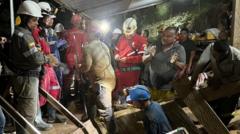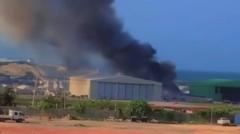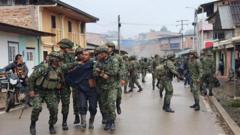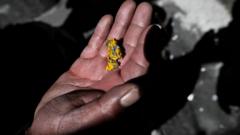The crash of a military helicopter in Ghana’s Ashanti region has resulted in the deaths of Defence Minister Edward Omane Boamah, Environment Minister Ibrahim Murtala Muhammed, and six others. Investigations are ongoing as the nation mourns the loss of its leaders.
Tragedy Strikes Ghana: Two Ministers and Six Others Killed in Helicopter Crash

Tragedy Strikes Ghana: Two Ministers and Six Others Killed in Helicopter Crash
The tragic accident involving Ghana's defence and environment ministers highlights the ongoing challenges faced by the region amidst weather and security concerns.
The Central Ashanti region of Ghana has been rocked by a tragic helicopter crash that claimed the lives of Defence Minister Edward Omane Boamah, Environment and Science Minister Ibrahim Murtala Muhammed, and six other individuals. Described by Chief of Staff Julius Debrah as a “national tragedy,” the crash occurred when a military Z9 helicopter was en route from the capital, Accra, to Obuasi for an event regarding illegal mining enforcement.
With no survivors among the eight passengers, the bodies were recovered from the wreckage and transported back to Accra, draped in the Ghanaian flag. A somber ceremony at the Air Force Base welcomed the caskets home, as the nation prepared for a period of mourning.
Investigations into the crash have yet to reveal a definitive cause, though preliminary reports indicate adverse weather conditions, including fog, might have played a role. Eyewitness accounts suggest the helicopter was flying unusually low and that poor visibility may have contributed to the tragedy. This incident marks the most serious of several incidents involving Ghana Air Force helicopters in recent years.
In the wake of the accident, President John Dramani Mahama announced three days of national mourning, halted his scheduled activities, and ordered flags to be flown at half-mast. He expressed sorrow on behalf of the nation for those lost, including notable figures such as Alhaji Muniru Mohammed, Ghana’s Deputy National Security Coordinator, and Samuel Sarpong, Vice-Chairman of the National Democratic Congress party.
Both Boamah and Muhammed were prominent figures in their respective fields. Boamah, who had previously served as communications minister and had taken on the defense portfolio amid rising jihadist threats in the region, was known for his commitment to security challenges along Ghana's northern borders. On the other hand, Muhammed had been a crucial advocate against illegal gold mining, which has sparked environmental concerns and public protests.
As Ghanaians grapple with the shock of this unexpected loss, discussions continue on how the nation will address the pressing security and environmental issues highlighted by the work of the deceased ministers. The crash is a stark reminder of the fragility of life and the ongoing struggles facing communities across Ghana.



















